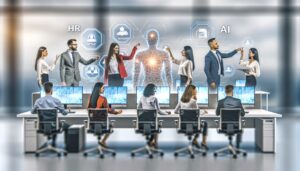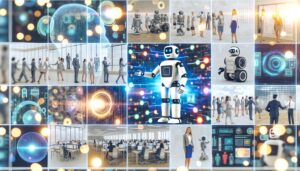The advent of artificial intelligence has drastically changed the way we interact on social network platforms. One significant development is the rise of content generation, where AI systems create and distribute content across various platforms. This article explores the impact of AI-driven content creation on social media engagement and its implications for the future.
The Evolution of Content Creation
Content creation on social media platforms has undergone a significant transformation since its inception. From simple text-based updates to multimedia content, and now, the rise of AI-driven content generation, each phase has been marked by technological advancements that have reshaped how we interact and engage on these platforms.
In the early days of social media, content creation was primarily user-generated, with individuals manually crafting their posts, images, and videos. This was a time-consuming process that required creativity and technical skills. However, it fostered a sense of authenticity and personal connection among users.
The advent of smartphones and mobile internet access democratized content creation further, making it easier for users to create and share content instantly. This led to the proliferation of visual content, particularly images and videos, which became increasingly important for engagement.
The next major milestone came with the introduction of algorithms that could analyze user behavior and preferences, tailoring the content they saw. This marked the beginning of AI’s influence on content creation, albeit indirectly. Platforms started using AI to curate content, personalize feeds, and even predict user interests.
Today, we are witnessing the rise of AI-driven content generation, where machines are not just curating but also creating content. This shift has the potential to revolutionize how we consume and interact with content on social media platforms. However, it also raises questions about the future of user-generated content and the role of humans in content creation.
The Impact of AI on Social Media Engagement
The advent of AI-driven content generation has significantly reshaped the landscape of social media engagement. On one hand, it has opened up new avenues for increased interaction and participation among users. For instance, AI-generated content can cater to diverse user preferences, thereby enhancing engagement levels. It can also help in maintaining a consistent flow of content, which is crucial for keeping users hooked onto social media platforms. Furthermore, AI-driven content can facilitate real-time engagement by generating responses to user queries or comments instantly, thereby fostering a sense of community and interaction.
On the other hand, there are several negative consequences associated with AI-driven content generation. One of the most pressing concerns is the spread of misinformation. Since AI systems lack human judgment and ethical understanding, they may inadvertently promote false or misleading information. This can have far-reaching consequences, especially in the context of political discourse or public health awareness campaigns. Additionally, the over-reliance on AI-generated content may lead to a homogenization of ideas and perspectives, stifling creativity and diversity in online discourse. Thus, while AI has the potential to revolutionize social media engagement, it is essential to address these challenges to ensure that the technology is used responsibly and ethically.
Ethical Considerations and Future Directions
The rise of AI-generated content in social media platforms has brought about a myriad of ethical considerations that cannot be overlooked. One of the most pressing concerns is privacy. As AI algorithms are increasingly capable of generating highly personalized content, they require access to vast amounts of user data. This raises questions about how this data is collected, stored, and used. Ensuring that users’ privacy is protected while still allowing for the creation of engaging content is a delicate balance that must be struck.
Another issue is authenticity. With AI-generated content becoming more sophisticated, it is becoming increasingly difficult to distinguish between genuine user-generated content and that created by machines. This blurs the lines between what is real and what is artificial, potentially leading to a loss of trust in online interactions.
Furthermore, there is the potential for manipulation. As AI algorithms become more advanced, they could be used to create highly persuasive content that influences public opinion or even sway political elections. This raises significant ethical concerns about the use of AI in shaping public discourse.
Looking ahead, it is likely that AI-driven content generation will continue to evolve and become even more integrated into our online lives. However, it is crucial that these advancements are accompanied by careful consideration of the ethical implications. This includes developing robust regulations to ensure privacy protection, promoting transparency in content creation, and addressing the potential for manipulation.
Ultimately, the future of AI-generated content in social media platforms will depend on our ability to navigate these ethical challenges. By doing so, we can harness the power of AI to enhance our online experiences while also safeguarding our values and principles.
Conclusions
In conclusion, the integration of AI-driven content generation in social network platforms is transforming the way we engage online. While it presents opportunities for enhanced interaction and information dissemination, it also raises concerns about authenticity and privacy. As we move forward, striking a balance between leveraging technology and preserving human touch will be crucial.



